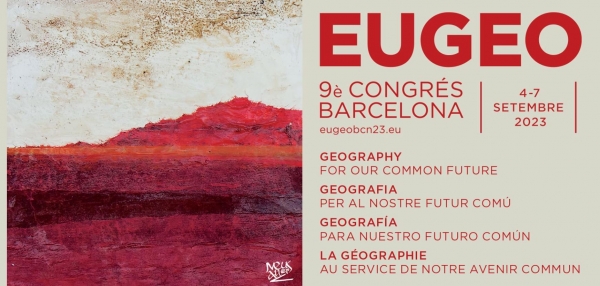Between September 4 and 7, the 9th EUGEO Congress was held, organized by the Catalan Geography Society and the University of Barcelona. This year, the conference was titled “Geography for our common future” and covered a wide range of topics that contribute to understanding our current conditions, the challenges we face and the necessary directions for humanity and the planet we share. In an exclusively face-to-face format, more than a hundred sessions and communications were held to present research in geography throughout Europe, and there were around 700 people registered.
The Geography and Gender Research Group of the UAB participated with the organization of two sessions: Emerging Ruralities (Mireia Baylina and Anna Ortiz) and gender perspectives in geography teaching in higher education sharing reflections practices and experiences (Maria Prats and Mireia Baylina).
Emerging Ruralities. Mireia Baylina and Anna Ortiz
The global events of recent years and in particular the Covid-19 pandemic, have made us question some bases of our economic and social model, valuing more the importance of agriculture in food supply, the importance of balance of ecosystems, responsible consumption, or the limits of growth. In the rural areas that surround us, innovative practices and processes proliferate that can generate new opportunities and that can be socially, environmentally and economically transformative.
This session focused on the tangible reality of current rural areas, bringing together emerging, critical and transformative economic and social initiatives of territories and communities. Thus, the purpose of the session was to offer a forum to discuss on the new dynamics of rural spaces and their transformative capacity in accordance with new global values.
The presentations made within the framework of the session were the following:
- Solidarity Tourism for (re)building resilience of rural areas: the case of conflict-affected Ukraine. Olena Motuzenko (Taras Shevchenko Kiiv National University, Ukraine); Viviana Ferrario (IUAV University of Venice, Italy); Anna Kanshieva (UN FAO Regional Office for Europe and Central Asia).
- Geographies of masculinities and new ruralities in Spain. Mireia Baylina (UAB); Maria Dolors Garcia Ramon (UAB); Montserrat Villarino (University of Santiago de Compostela); María Josefa Mosteiro (University of Santiago de Compostela); Ana María Porto (University of Santiago de Compostela); Isabel Salamaña (University of Girona).
- Emerging rural geographies in the Sultanate of Oman between modernity and tradition: a potential renaissance of ancient villages through tourism and hospitality. Angelo Battaglia (Tashkent International Westminister University).
- Queering Catalan Rurality: Exploring Urban-Rural Migration of Sexual and Gender Dissident Youth in Catalonia. Laura Soler Rodríguez (Predoctoral student UAB).
- Los espacios rurales como áreas de diálogo y creatividad intercultural. Salvador Beato Bergua (University of Oviedo); Noelia Bueno Gómez (University of Oviedo); Daniel Herrera Arenas (University of Oviedo); Jesús Moreno Arriba (University of Salamanca); Alfonso Suárez Rodríguez (University of Oviedo).
- Love in a Rural Village: An Action Research Study on Transforming Rural Education in Taiwan with Human Geographic Values. Yu-Chun Ku, Ming-Hung Wu, Ching-Yao Wang (National Dong Hwa University).
- The “other” rural: from a book to the territory. Rosa Cerarols (Pompeu Fabra University); Joan Nogué (University of Girona).
- Rural childoods in Catalonia: emotions, daiy life and spaces. Mireia Baylina y Anna Ortiz (UAB).
- Geographies of coworking spaces and platform-mediated digital nomad mobilities in rural Catalonia. Julie Wilson, Lluís Garay, Carles Méndez, Inés Gutiérrez, Mar Alsina (Open University of Catalonia).
Gender perspectives in geography teaching in higher education sharing reflections practices and experiences. Maria Prats and Mireia Baylina
The incorporation of the gender perspective in geography has transformed the discipline: it has expanded our conception of space and place and has contributed to rethinking the socio-spatial processes that shape our lives. The social construction of difference conditions the experiences of men and women in different geographical contexts. Likewise, our gender experiences are also conditioned by other factors of social differentiation such as class, race, ethnicity, age, religion, sexuality, citizenship, language and functional diversity, among others.
In this session, reflections and practical experiences on teaching geography in higher education from a gender and/or intersectional perspective were shared with the aim of allowing collective learning and advancing critical pedagogies. The session was organized into two blocks, one of a more reflective nature and another of teaching practice.
The presentations made within the framework of the session were the following:
- Teaching gender in the European academia: reflections on the teacher’s positionality and beyond. Camilla Spadavecchia (Tilburg University).
- Teaching gender: reflections and experiences from the University Social Geography course. Dr. Alena Rochovska (Comenius University Bratislava).
- Situating feminist perspectives in dutch human geography and planning education: towards a re-engendered teaching agenda. Marielle Zill and Dr. Krisztina Varró (Utrecht University).
- Comprehensive Sexual Education (CSE) in Adult Geography Education in Argentina. Magdalena Moreno (UAB).

